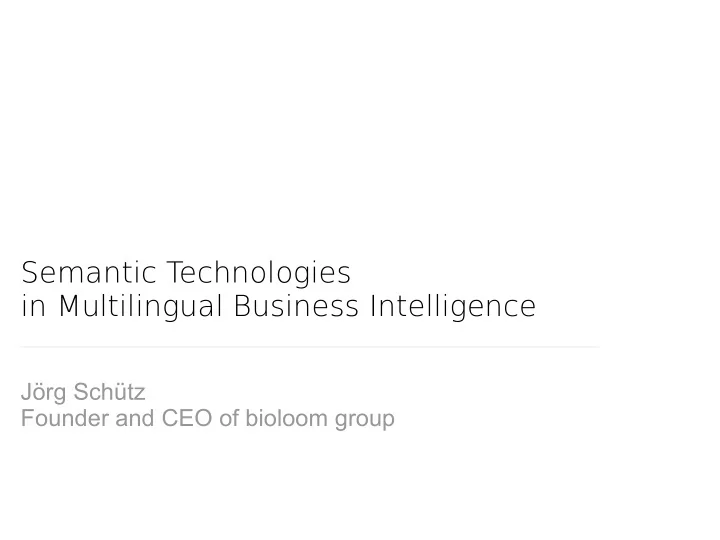

Semantic T echnologies in Multilingual Business Intelligence Jörg Schütz Founder and CEO of bioloom group
What is Business Intelligence ?
What is Business Intelligence ?
recognition of
• patterns • inclinations • exceptional conditions
Traditional BI 20k datatypes • 60k functions • over 100k data elements
Requirements Business Analysts & Users Design Deliver Business analysts, IT Developers, IT Developers DB Administrators & Consultants & Users Develop IT Developers, DB Administrators & Consultants
oo many people • too few iterations • too slow • too T expensive
Emerging BI new dynamic data resources • online algorithms • agility • open source software developments • browser-based • interoperability • real-time access
modeling (metadata) data ops prosumer-centric service access visualizing fast • many iterations • cost effective
Necessity of multilingual BI multilingual data • real-time analytics • sentiment analysis • interoperability with LT • standards to bridge and mesh with applications
Monolingual language issues
noncontroversial controversial Controversial but implementation controversial dependent Derived from a Regular structure Irregular structure Blog.
Linkage of different ecosystems
Each ecosystem has its own standards...
XMLA • BPMN • UML • Six Sigma • Unicode • ... ITS • XLIFF • MLF • TMX • TBX • SRX • GMX • Unicode • ...
XMLA • BPMN • UML • Six Sigma • Unicode • ... ITS • XLIFF • MLF • TMX • TBX • SRX • GMX • Unicode • ...
XMLA • BPMN • UML • Six Sigma • Unicode • ... ... • protocols • serialization • lossless interchange • ... ITS • XLIFF • MLF • TMX • TBX • SRX • GMX • Unicode • ...
Business / Process Intelligence Ecosystem p R i o r u t d n n d u t r o i R p Multilingual Language Resources Ecosystem
Bridging the gap...
… with semantic technologies to fulfill the linkage in quasi real-time
data • modeling / term / rules • query / inference • extract RDF • RDFS & OWL / SKOS / RIF • SPARQL • GRDDL / RDFa data • modeling / term / rules • query / inference • extract
How do communities (inter-)act?
• trust in own standards • fear for complexity increase • lack of reference implementation • outpaced by technology • lack of exchange between solution providers • uncertain involvement of buyers / customers
What is missing?
● common mindset for change ● exchange between communities ● joint reference implementations with strong commitment to interoperability ● self-adapting and self-learning technologies
And there is one more thing ... Join the interoperability discussion at http://interoperability-now.org
Thank you for your attention! joerg@bioloom-group.com
Recommend
More recommend